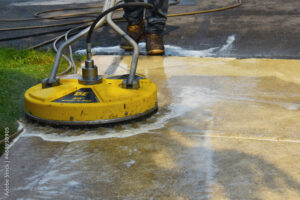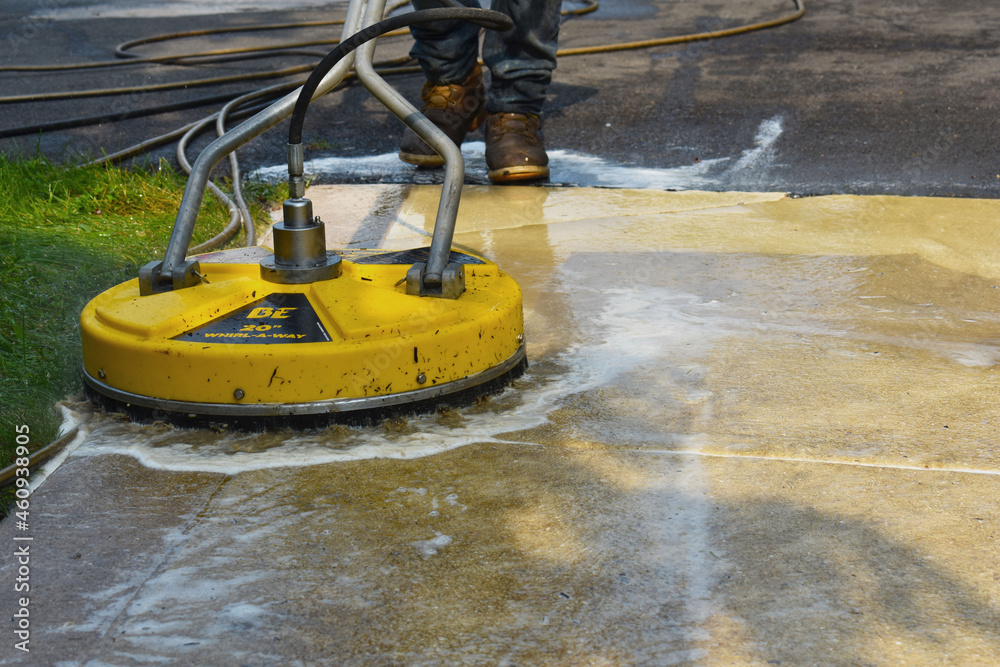Dirt, mildew, mold, and other nasties like grease, dust, and bird droppings can build up on surfaces over time. Pressure washing removes these and gives properties a great look and feel. A pressure washer is a machine that runs on electricity or petrol and uses a pump to boost water flow through the hose at high pressure when a trigger is pulled. Electric models run off the garden hose and are convenient, light-duty machines. Gas pressure washers, often over 3,000 psi, deliver higher water pressure and are ideal for preparing siding for painting or deep-cleaning concrete. Go to https://summervillepressurewashing.com/ for more tips.
A pressure washer is a machine that amplifies the water that flows through your garden hose, allowing you to blast away dirt, mold, mildew, and grime on surfaces around your home. It’s particularly effective for cleaning outdoor areas, including driveways, patios, decks, brick and concrete paths, parking lot building exteriors, pool decks, fences, and kids’ outdoor plastic/ metal/ timber toys. It also cleans the greasy gunk on your wheely bins and is great for cutting through layers of dried and rotted mulch in your gardens.

The best pressure washers deliver more cleaning power than your typical garden hose. They will remove deep-set stains, mold, mildew, algae, grease, and other contaminants that can degrade the appearance of exterior surfaces, such as paint, wood, and stone. When selecting a pressure washer for your home, it’s important to consider the PSI (pressure per square inch) and GPM (gallons per minute) ratings. The more powerful the unit, the faster it will clean.
If you want to purchase a new pressure washer for your home, it’s helpful to know that manufacturers rate their PSI and GPM ratings differently. It’s best to look at the PSI and GPM ratings together to determine how much cleaning power you need for your home and garden.
In addition to providing an immediate boost to your property’s curb appeal, regular maintenance with a pressure washer reduces the need for harmful chemical cleaners. These chemicals can wreak havoc on the environment and leave behind toxic residues. On the other hand, pressure washing uses only water and can lift stains without harming surface materials.
If you’re considering selling your property, investing in a pressure washer to increase the value and appearance of your home and garden is a good idea. Adding an instant boost to your property’s curb appeal makes it stand out from the competition and is a surefire way to draw in potential buyers when you’re ready to sell.
Pressure washers half garden -hose half air compressor. They deliver high-pressure water spray, courtesy of an engine-powered pump (fuel-, diesel-, electrical, or propane gas-fueled engines are common), through a garden hose to a metal spray gun that looks like the kind used at car washes. Pressurized water blasts out of a nozzle at up to 3,500 pounds per square inch (psi) when the trigger is pulled.
To avoid damaging surfaces being cleaned or harming yourself, always use a pressure washer with detergent and follow the operator’s manual to select a proper nozzle and spray angle. A lower psi setting is more gentle and effective for general cleaning jobs; higher psi settings are ideal for stripping paint or removing stubborn grease or oil.
While it may seem counterintuitive, keeping the pressure washer nozzle pointed away from living plants and other sensitive surfaces is important to avoid killing or damaging them. Wearing protective goggles when operating the pressure washer is also a good idea.
Some models are equipped with a turbo feature that boosts the pressure of the water spray for extra power, especially when tackling particularly tough or stuck-on dirt and grime. Having one of these models on hand can make a big difference in getting the job done more quickly and effectively, saving you both time and effort.
When shopping for a new pressure washer, look for one that offers the power you need and is easy to operate and maintain. The best units have a user-friendly control panel that lets you set the water flow and pressure and change the nozzles easily. The hose should be kink-resistant and long enough to reach your cleaning site without straining.
A gas-pressure washer provides more powerful cleaning at up to 3,000 psi, which makes it better suited for deep-cleaning concrete or preparing wood or masonry for painting. However, this type of machine can be loud, creating harmful exhaust fumes while in operation. An electric pressure washer is more affordable and versatile if you plan to do something other than perform high-intensity cleaning tasks regularly.
A pressure washer is not as dangerous as a power saw, but it is still a powerful piece of equipment that can cause serious injury. Wounds from the water spray may appear minor at first but can lead to infection, disability, and even amputation if they are not treated quickly. The fast, strong spray can also throw objects that strike and injure others. The small, gasoline-powered engines of pressure washers can generate carbon monoxide. They should only be used inside buildings or partially enclosed spaces if the equipment can be outdoors and away from air intakes.
Injuries from the spray are not the only potential hazards; other risks include slipping and falling, electric shock, and exposure to chemicals. For these reasons, wear personal protective equipment from head to toe, including heavy-duty rubber gloves and safety goggles that are impact-resistant or anti-fog. Gloves should be durable and long enough to cover your whole hand, with an ergonomic fit that doesn’t compromise your grip. Protective goggles are designed to be comfortable and easy to adjust while ensuring they stay in place over your eyes even as you move around.
When using a pressure washer, start with the widest nozzle tip and only use higher-pressure settings if necessary. Avoid the zero-degree nozzle, which concentrates the tool’s pressure into a pinpoint spray that can injure you. Choose a green or white nozzle for most jobs; these have a wider spray angle that is less likely to damage surfaces. Reserve red and yellow nozzles for tougher cleaning that requires the extra force provided by a narrow spray angle.
Never point the pressure washer at anyone; make sure it is turned off before moving or adjusting its wand. Avoid walking in front of the rod or standing too close while it operates; the strong stream can knock you down and cause serious injuries. Always keep a fire extinguisher handy in case of an emergency. Finally, ensure the pressure washer’s power cord is not touching anything that can get wet – it could create an electrical shock.
Powered by a gas engine or an electric motor, pressure washers force water and detergent through a concentration of nozzle at high pressure. The resulting blast effectively washes away and dissolves accumulated grime on surfaces like decks, driveways, patios, outdoor furniture, and some types of siding. However, because these machines operate under such high-pressure levels, their hoses and nozzles can be damaged when not properly maintained.
Inspecting and cleaning the equipment before and after each use is critical to its long-term performance. For gas engine units, always shut off the engine and wait until moving parts have stopped rotating before inspecting, cleaning, or servicing the machine. Also, depressurize the system by pointing the nozzle somewhere safe and squeezing the trigger until the spray no longer emits water.
Because the high-pressure liquid passing through a pressure washer is pressurized, hoses and nozzles are vulnerable to degradation over time, especially when exposed to sunlight or extreme temperatures. Ensure that the nozzles are not clogged or showing signs of wear and tear, and replace them as needed. Be sure to keep a backup nozzle in case of damage. Replacing the filter on the detergent siphoning tube regularly is also recommended to prevent clogs and mold growth.
A pressure washer is a valuable tool that can be used to clean a wide variety of items in a fraction of the time it would take using a scrub brush and a garden hose. Routinely washing surfaces with a pressure washer helps reduce the build-up of grime and contaminants like mold, mildew, tannin stains from leaves and sticks, rubber marks on tires, and oil and irrigation rust. It can save homeowners thousands of dollars in potential home repairs from rot and leaks caused by dirt and other debris.
A routine maintenance schedule includes:
- Adding a fuel stabilizer to the tank.
- Examining the air filter.
- Changing the engine oil per the manufacturer’s specifications.
Be sure to consult the operator’s manual for specific guidelines and check with your local hazardous waste management guidelines to determine how to dispose of any lubricant used in the engine.

